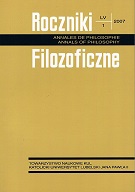O filozofii matematyki Imre Lakatosa
On Imre Lakatos’ Philosophy of Mathematics
Author(s): Krzysztof WójtowiczSubject(s): Philosophy
Published by: Towarzystwo Naukowe KUL & Katolicki Uniwersytet Lubelski Jana Pawła II
Keywords: mathematical quasi-empiricism; arithmetic falsifier; Euler’s hypothesis; heuristic style; anti-fundationism; quasi-empiryzm matematyczny; falsyfikator arytmetyczny; hipoteza Eulera; styl heurystyczny; antyfundacjonizm
Summary/Abstract: The paper is concerned with Imre Lakatos’ philosophy of mathematics; it contains a presentation of Lakatos’ views and a critical analysis. Lakatos formulates his conception on the basis of a case study – namely, the history of Euler’s hypothesis concerning polyhedrons. Differentiation of Euclidean and quasi-empirical theories depending on mechanisms of justification of the theses of a given science is crucial to Lakatos’ conception. Lakatos opposes the view according to which mathematics has a Euclidean character, i.e. it is created by deducing theorems from axioms. In mathematics we deal with the mechanism of formation of explaining hypotheses for basic propositions (which are propositions accepted in informal mathematics) and in this respect it reminds of empirical sciences. The paper — apart from presenting Lakatos’ conception — also contains several critical remarks. I assert that the concept of arithmetic falsifier for multiplicity theory he introduced is not well justified. I prove the thesis that although examples on which Lakatos’ conception is based do have a historical value, they do not have any reference to contemporary mathematics. And finally I assert that it is doubtful if the way of presenting mathematical problems that Lakatos used can have a didactic value.
Journal: Roczniki Filozoficzne
- Issue Year: 55/2007
- Issue No: 1
- Page Range: 229-247
- Page Count: 19
- Language: Polish

